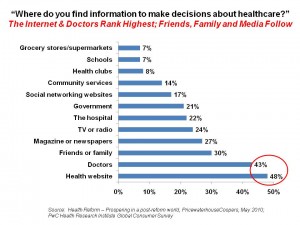 1 in 2 global health citizens looks first to the Internet for advice to make health decisions; then, they look to doctors.
1 in 2 global health citizens looks first to the Internet for advice to make health decisions; then, they look to doctors.
This virtual tie for ‘first place’ in health information that supports health decision making is the New Second Opinion for at least one-half of the population, according to data gleaned through PricewaterhouseCoopers‘s Health Research Institute’s Global Consumer Survey.
Traditional media, including print (newspapers and magazines) and broadcast (TV, radio) are go-to health information sources for about 1 in 4 health consumers.
Social networking websites were found to be useful health information decision-support sources by 17% (say, nearly 1 in 5 people).
Health Populi’s Hot Points: Health citizens the world over are getting more engaged in their health, with one-half seeking information from websites as well as doctors. This is a point in time in 2010.
Over time, though, these numbers will change. The Internet will grow as a channel of information for health consumers. Traditional media will recede in usefulness and importance.
The areas that will grow in importance, accessibility and utility will be those ‘channels’ at the bottom of this list: schools, clubs, grocery stores, and communities-at-large. Health care is largely local, and ‘my’ health is personal. Personal sustainability is nurtured in one’s community — which can surely be global in reach when it comes to support and access to health wisdom online. But offline, and real-time, there’s richness and wisdom to be gained in one’s local community.
I’m particularly keen on the movement of grocery stores and the larger food and beverage industries in their expansion toward ‘health.’ We already see the growth of retail health through the chain pharmacy within food stores, as well as retail health clinics which, while they’ve stalled in growth, are positioned to do well in a post-reform world as health citizens take on more responsibility for their health choices and financing options. Watch for the grocery to go way beyond “free antibiotics” and cheap generics for a 90-day’s supply. The food store can be a health hub for many people who manage chronic conditions and, well, also need to eat.




 Thank you, Trey Rawles of @Optum, for including me on
Thank you, Trey Rawles of @Optum, for including me on  I was invited to be a Judge for the upcoming
I was invited to be a Judge for the upcoming  For the past 15 years,
For the past 15 years,